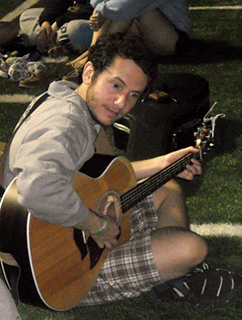Top five reasons I “Oy!”
Permanent link All Posts
As your new managing blogger for Oy!Chicago, I thought I owed you a little bit about myself. But rather than glaze your eyes over reading my lengthy list of previous part-time jobs (mine glaze over listing them), I figured I would take a slightly more intOy!resting approach.
“Oy!” – a centuries-old Yiddish lamentation, a culturally identifiable way to voice your frustration, a staple of Jewish parody songs and probably what a sigh would literally say if it could talk as well as quickly expel air. “Oy” has become so engrained in the cultural definition of Judaism that – like bagels and nagging mothers – it has moved beyond stereotype and into the category of stereotypes deemed so universally true that they cannot be refuted.
I’ve used “oy!” plenty in my life, so in the spirit of warming up to you all, I thought I’d break the ice with a list of the five reasons the chosen utterance of the chosen people has left my lips.
1. Bodily pain
I have to admit there are days I feel like a 26-year-old in a 62-year-old’s body, though I’m sure many 62 year olds are in better shape than I am. In my 20s alone I’ve had bouts with heartburn, pulled neck muscles, sciatica (which is impossible to say aloud without sounding like a kvetching 80-year-old snowbird from Long Island) and an overuse injury with my knee the doctor couldn’t diagnose, among others. Getting up, sitting down, moving in a funny direction – it all amounts to a whole lot of “oy.”
At the same time, I recognize that we all have our physical shtick, and for all intents and purposes, I’m healthy and very fortunate to be so. “Oy” in this instance is not so much a complaint with my medical lot in life, but the audible byproduct of the old-fashioned grin and bear it, a verbal way to push forward and focus on the positive.
2. To impress my Yiddish-speaking grandparents
I’ve always been rather fascinated by Yiddish. It’s a perfect language. It pounds down the harsh sound of German into something as good for comedy as it is for insults, and every word sounds exactly like what it means. More importantly, it’s what my grandparents speak. I think most of my generation at one point or another has become fascinated by whatever foreign language our grandparents spoke. Mine speak Yiddish, but not outwardly or in situations when communication is vital, but most often in emotion-filled moments (good, bad or hilarious) when English simply won’t do.
Listening to my grandfather go on rants and sing ditties entirely in Yiddish, and watch as my grandmother understands him and immediately shakes her head at his folly, has turned Yiddish into this secret language of an exclusive club, one that I quickly recognized was seeing its membership rapidly declining. I have tried to memorize as much Yiddish as possible, and in the presence of my elders, it slips out more than usual. Around them, “oy vey” becomes “oy vey iz mir” (the Yiddish “Woe is I”). I would give more examples, but I don’t think I’d be allowed to write for Oy! ever again, and I’ve barely gotten started.
3. To sympathize with others’ misfortune
Last week when it was pouring rain, my roommate told me he sat in an hour and a half of traffic on his way back into the city from work. Pretty needless to say at this point, “oy” was my immediate reaction.
We usually use “oy” in the subjective, as it relates to how we feel when we are personally dismayed, but in this case it served as a much more sympathetic way of saying what I would have said if I’d been exposed to considerably less Yiddish: “that sucks, dude.”
4. Singing Jewish music
You know that part-time job list I mentioned earlier? Well I need to go there for a second. I am also a songleader. I was inspired at Jewish summer camp, trained at Jewish summer camp, worked at Jewish summer camp and then took my skills out into the world as a professional when my degree in journalism failed to fill up my time and my pockets.
“Oy!” has become connected to Jewish music through the tradition of Yiddish music, which played a large role in bringing music into the synagogue. It’s not in most of the music being sung at camps, but a fair share of songs have Yiddish or Hasidic origins and shouting “oy!” seems to be prevalent in a good portion of those songs. Here, its connotation is positive, a way to express excitement or drive the energy of a song. As someone who also writes music, however, I imagine it was probably just intended to fill dead space.
5. Thinking of ways to make Oy!Chicago better
I haven’t written for Oy! until now, but I’ve spent the past few weeks thinking a lot about how to make it better for all us “Jews in the Loop.” I suspect it will eventually get to the point that whenever I say “oy” due to reasons one through four, I’m bound to think of what post needs to go up at that given moment. I fear I will wire myself to associate back pain with blogging now. I can deal with that, so long as it’s not vice-versa.
In all seriousness, I do want to explore the ways to make your time reading Oy! rewarding. I want to find ways for us to talk to each other and learn from our shared experiences and celebrate what it is to emerge as a Jewish adult in today’s world. To speak bluntly, we’re Oyin’ this together.



.jpg)



